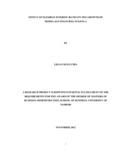| dc.description.abstract | This paper attempts to find out the effect of flexible interest rates on the growth of mortgage financing in Kenya during the financial period 2007 – 2011 .The study found out that the flexible interest rates have a negative effect on mortgage financing in Kenya. This study is significant as it will seek to understand the competitive environment of the banks and other financial institutions in the country as they seek to offer affordable housing to Kenyans. Financial distress in the past has caused many banks to collapse in the past which has impacted negatively on the entire economy of the nation. Commercial Banks have therefore had to diversify their income sources from traditional intermediation income generating activities to non-intermediation income generating activities. The findings of this study conducted on 26 commercial banks in Kenya and the Housing Finance of Kenya relied on secondary data from annual reports of the banks. Regression analysis was mainly used to reveal that flexible interest rates charged by the financial institutions have a negative effect on mortgage financing. If banks charge a fixed rate of interest, it would be possible for investors to plan for a predictable amount of money to be repaid hence stability and increased level of borrowing. The regression analysis conducted established a negative and significant relationship between flexible interest rates and mortgage financing. The other independent variables had mixed effects on mortgage financing. Inflation, non performing loans, liquidity ratio had negative effects on mortgage financing while money supply, gross domestic product, customer deposits, bank capitalization and bank size had positive effect on mortgage financing. It is also evident from the study that without the diversification of income sources by commercial banks in Kenya most of them would have struggled with their objectives of maximizing shareholders wealth or eventually collapsed. It is also evident from the study that without flexible interest rates, banks would not be able to lend since this is also affected by the cost of borrowing from the customers through deposits. | en |

